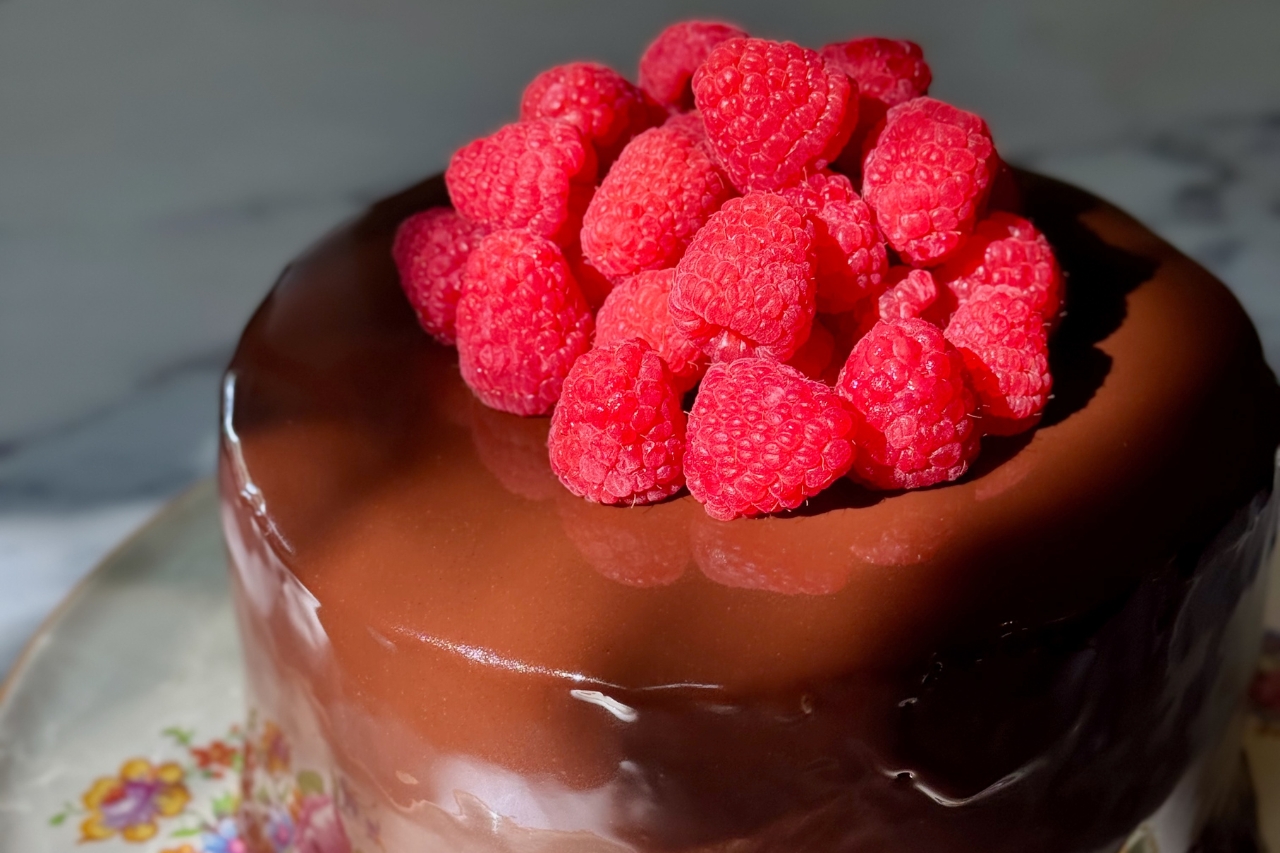
Chocolate mirror glaze cake with raspberry coulis is officially the cake of the summer — thanks to the hit series The Summer I Turned Pretty. This stunning cake looks as if it were straight out of a fancy bakery. And while it does require some patience and skill to recreate at home, it’s so worth the effort. Whether you’re baking this with love for someone special or just want to impress your guests, this cake will surely do the trick. Let this be the summer you made a chocolate mirror glaze cake!
Related: Raspberry White Chocolate Sheet Cake
ingredients
Chocolate cake
Raspberry coulis
Chocolate ganache
Mirror glaze:
Assembly
directions
For the chocolate cake: preheat oven to 350º F. Grease and line three 6-inch pans.
In a large bowl or the bowl of a stand mixer, combine flour, sugar, cocoa, baking powder, baking soda, salt and espresso powder. Whisk or use the paddle attachment to combine well.
Add milk, neutral oil, eggs, and vanilla to flour mixture and mix well until combined. Add boiling water and mix until thoroughly combined.
Pour cake batter into prepared cake pans, baking for 40 minutes or until a toothpick inserted into the centre comes out clean.
Cool in the pan for 10 minutes, then remove from the pan and transfer to a wire rack to cool completely.
If your cakes have domed in the middle, use a sharp, serrated knife to even out once cooled.
For the raspberry coulis: combine frozen raspberries, granulated sugar and water in a saucepan, simmering over medium-low heat until sugar is dissolved and raspberries have broken down.
Optional: for a thicker coulis, combine water with cornstarch to create a slurry before adding to saucepan.
Strain through a fine-mesh strainer, pressing down to extract as much as possible. Cover and refrigerate for 1 hour or until chilled.
For the chocolate ganache: Place chocolate chips in a large, heat-proof bowl. Pour cream into a small saucepan over medium-high heat, and heat until hot and steaming but not boiling.
Pour cream over chocolate chips, ensuring the chocolate is covered by the cream. Let sit for 10 minutes uncovered.
Using a rubber spatula, stir mixture until smooth, ensuring there are no lumps.
Let chocolate ganache cool on counter for 30 minutes, then cover with plastic wrap and refrigerate for 3 hours in the fridge or overnight.
For the mirror glaze: combine 2 ½ tablespoons of water and gelatine in a small bowl. Mix until well combined, then let sit for 5 minutes: it will become solid and rubbery.
Whisk together cocoa and remaining water in a medium saucepan until it forms a paste. Add heavy cream and sugar, gently mixing to combine.
Place over medium heat, bring mixture to a boil, and immediately remove from heat.
Add gelatine mixture to the saucepan and stir gently until it’s dissolved and the glaze is smooth and glossy.
Strain glaze mixture over a shallow bowl using a fine-mesh strainer. Twist the bowl between your hands to reveal any bubbles. If bubbles appear, pop them using a toothpick or passing a blowtorch over the surface, which will pop them.
Cover glaze with plastic wrap, pressing it into the surface, and cool on counter until it reaches 91°F.
Note: If glaze cools below that temperature and forms lumps, microwave in 20 second increments, stirring to remove any lumps, then wait for it to reach 91°F.
For cake assembly: pipe ganache on cooled cake in an even swirl, then smooth with an offset spatula and top with half of the raspberry coulis.
Note: Because the ganache is so thick, piping allows you to get a smooth, even consistency.
Place second layer of cake on top and repeat previous step. Finish by covering top and all sides of cake with remaining ganache.
Note: Try to get it as smooth as possible, as this will yield the most reflective mirror glaze.
Chill cake in fridge for 2-3 hours, then do one final pass with offset spatula to smooth out chocolate ganache again (it will be easier to smooth once the cake has chilled and the ganache has firmed up slightly).
Transfer cake from fridge onto a rack set over a baking tray to catch any excess glaze
Just before glazing the cake, strain the mirror glaze again over a shallow jug using a fine-mesh strainer to remove any additional lumps that have formed.
Immediately pour mirror glaze over cake in one swift, smooth motion, starting in the centre, then moving towards outer edges to ensure all of the cake is coated in mirror glaze.
Note: It’s important to work quickly while the glaze is still at the ideal temperature to avoid any lumps forming.
Before the mirror glaze sets, transfer the cake to a platter using a knife and offset spatula underneath to lift and move.
Decorate cake with fresh raspberries on top, then slice and serve.
